Tennis matches are won and lost in your mind just as much as on the court. Physical skills get most of the spotlight, but mental toughness stands as a defining characteristic between good and great tennis players.
Mental Toughness for Tennis is crucial for achieving peak performance and success in competitive play.
The pressure of competition, missed shots, and momentum swings can break even the most skilled players.
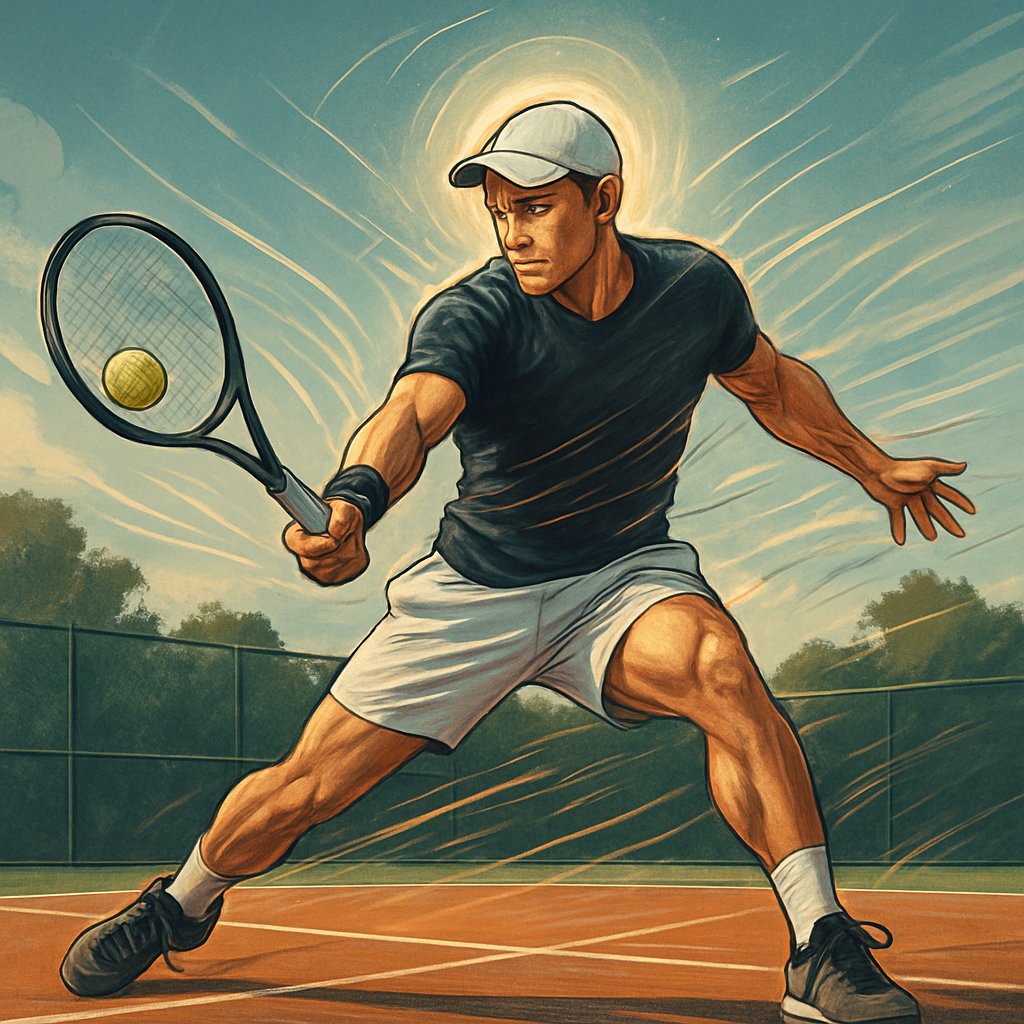
Mental toughness in tennis builds through specific conditioning practices that train your mind to stay strong under pressure. Your ability to bounce back from mistakes, keep your focus during long rallies, and perform when it really counts comes from deliberate mental training.
Incorporating Mental Toughness for Tennis into your training can significantly enhance your performance on the court.
Building mental resilience requires dedication, just like your serve or backhand. You can develop the psychological skills that separate champions from weekend players through proven techniques and consistent practice.
The strategies you learn will help you stay calm in tight matches and recover quickly from setbacks.
Key Takeaways
- Mental toughness develops through specific conditioning practices rather than natural talent alone
- Visualization, focus training, and emotional control are essential skills for competitive tennis success
- Consistent mental training helps you perform under pressure and bounce back from mistakes quickly
The Foundations of Mental Toughness in Tennis
To truly grasp Mental Toughness for Tennis, you must understand its fundamental aspects and benefits.

Mental toughness separates good tennis players from great ones through specific psychological traits and learned skills. Understanding what mental resilience means and how tennis psychology works gives you the foundation to build unshakeable mental fortitude on court.
Developing Mental Toughness for Tennis can be achieved through various techniques and consistent practice.
Defining Mental Toughness and Resilience
Mental toughness in tennis means your ability to stay focused and perform well when facing pressure, setbacks, or challenging situations. It’s not just about being tough or aggressive.
Mental resilience involves adaptability, patience, and self-belief that help you handle the ups and downs of matches.
When you miss an easy shot or lose a close set, mental toughness keeps you playing your best tennis. Psychological resilience works differently than physical toughness.
Your body might feel tired, but your mind stays sharp and ready to compete.
Key Components of Mental Toughness:
- Emotional control under pressure
- Quick recovery from mistakes
- Sustained focus during long matches
- Confidence in your abilities
Mental fortitude develops through practice, just like your forehand or serve. You can train your mind to stay calm when the score is tight or when you’re playing someone better than you.
Key Traits of Mentally Tough Tennis Players
Key traits associated with Mental Toughness for Tennis include resilience, focus, and emotional control.
Mentally tough tennis players share specific traits that help them win close matches and bounce back from losses. These traits can be learned and improved over time.
Focus and concentration rank as the most important mental skills. You need to stay present on each point instead of thinking about past mistakes or future outcomes.
Emotional regulation helps you control anger, frustration, or anxiety during matches. Top players show the same composure whether they’re winning or losing.
Research shows that resilience, concentration, and positive self-talk enhance your game more than any single mental skill alone.
Essential Mental Traits:
- Resilience: Bouncing back quickly from errors
- Confidence: Believing in your shots under pressure
- Patience: Waiting for the right opportunity to attack
- Adaptability: Adjusting your game plan when needed
Mentally tough players also embrace challenges instead of avoiding them. They see difficult opponents or tough situations as chances to improve rather than threats to avoid.
The Role of Tennis Psychology
Tennis psychology focuses on the mental skills that directly impact your performance on court. Unlike general sports psychology, tennis psychology addresses the unique mental demands of individual competition.
Professional players use visualization, focus training, and emotional control techniques to maintain their competitive edge.
These same methods work for players at every level.
Core Areas of Tennis Psychology:
- Pressure management: Staying calm in big moments
- Attention control: Focusing on the right things at the right time
- Confidence building: Developing trust in your abilities
- Stress response: Managing nerves and anxiety
Your mental game needs the same systematic training as your physical skills. Mental conditioning requires consistent practice and dedication to see real improvements.
Tennis psychology also teaches you how to prepare mentally before matches. This includes developing pre-match routines, setting realistic goals, and creating positive self-talk patterns that support peak performance.
Building Resilience Through Conditioning
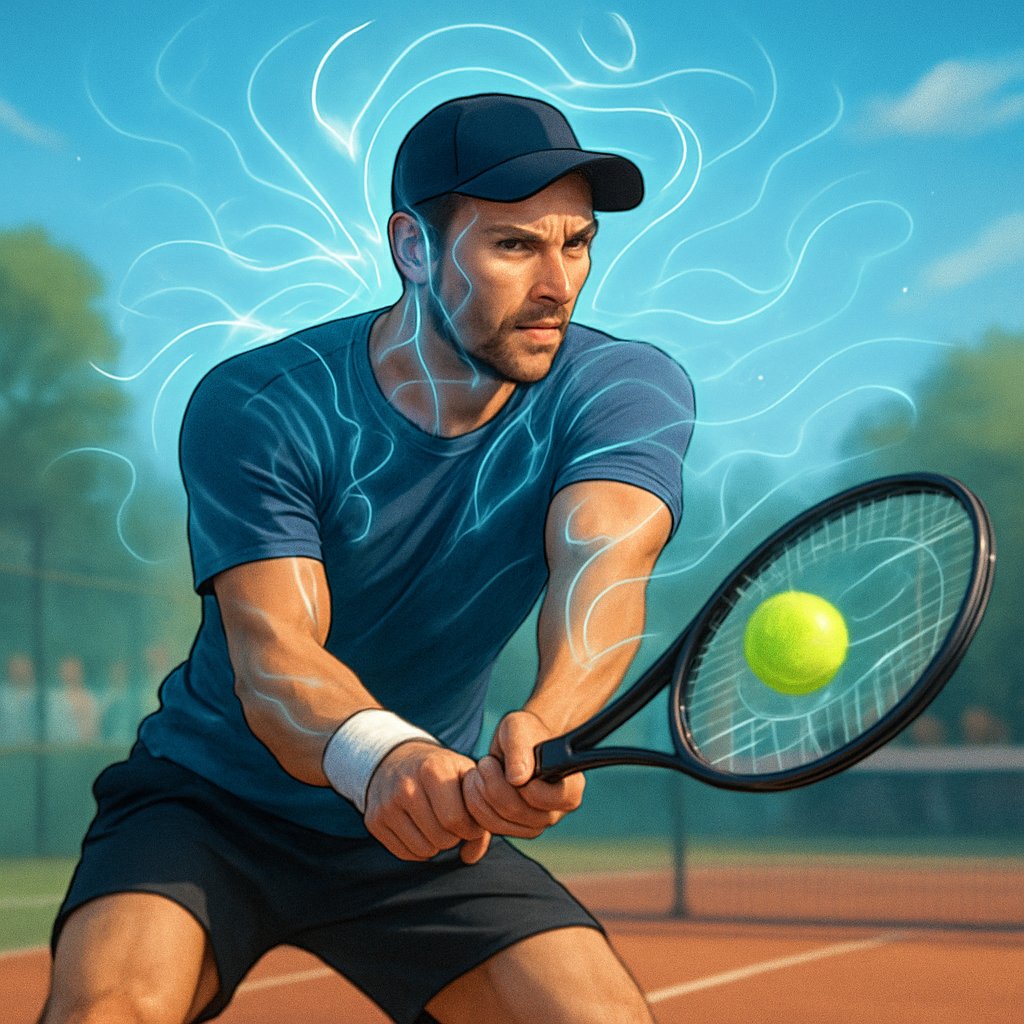
Mental conditioning creates the foundation for consistent performance under pressure. Physical training methods directly impact your ability to stay focused and confident during challenging tennis matches.
Mental Toughness for Tennis allows players to maintain focus and composure in high-pressure situations.
Conditioning Strategies for Mental Strength
Physical conditioning builds more than just muscle strength. It develops your mental capacity to handle stress and keep your focus during long matches.
Endurance Training Benefits:
- Improved concentration during third sets
- Better decision-making when fatigued
- Increased confidence in your fitness level
- Reduced anxiety about match length
Interval training mirrors the stop-and-start nature of tennis. Sprint for 30 seconds, then recover for 90 seconds.
This pattern teaches your mind to reset quickly between points. Circuit training with tennis-specific movements builds both physical and mental stamina.
Include exercises like lateral shuffles, overhead reaches, and quick direction changes. Your breathing patterns during conditioning directly transfer to match situations.
Practice controlled breathing during intense training sessions. This builds automatic responses you can use during pressure points.
Mental Training During Conditioning:
- Count repetitions to practice focus
- Use positive self-talk during difficult sets
- Visualize match scenarios while training
- Practice staying calm when your heart rate increases
Regular conditioning sessions create mental toughness through consistent challenge. Each completed workout proves you can push through discomfort and fatigue.
Training for Performance Consistency
Practicing Mental Toughness for Tennis not only improves your game but also strengthens your mental fortitude.
Consistent training schedules build reliable mental patterns. Your brain learns to perform at specific times and under certain conditions.
Practice sessions should include pressure situations. Serve when you’re tired. Play points after intense physical drills.
This training for performance consistency prepares your mind for real match scenarios.
Consistency Training Methods:
| Training Type | Mental Benefit | Physical Benefit |
|---|---|---|
| Daily practice routine | Builds discipline | Maintains fitness |
| Pressure point drills | Improves focus | Enhances coordination |
| Fatigue training | Develops resilience | Increases endurance |
| Recovery sessions | Teaches patience | Prevents injury |
Track your training performance daily. Write down how you felt mentally during different exercises.
This data helps identify patterns in your mental state and performance levels. Simulate match conditions during practice.
Use the same pre-point routines you’ll use in competition. Practice your between-point recovery breathing and positive self-talk.
Progressive overload applies to mental training too. Gradually increase the pressure and intensity of practice situations.
Start with friendly matches, then move to tournament-style pressure.
Adapting to Match Challenges
Match situations require quick mental adjustments. Your conditioning should prepare you for various challenges you’ll face during competition.
Emphasizing Mental Toughness for Tennis will prepare you for the inevitable challenges of competitive play.
Common Match Challenges:
- Weather changes affecting court conditions
- Opponent strategy shifts mid-match
- Crowd noise and distractions
- Score pressure in crucial games
- Physical fatigue in long matches
Practice sessions should include unexpected elements. Have someone call out distractions during your serve.
Change court surfaces mid-practice when possible. Play in different weather conditions.
Mental resilience in tennis develops through repeated exposure to challenging situations.
Your brain builds confidence by successfully handling difficult scenarios in practice. Create specific drills for common match problems.
Practice serving when trailing in games. Hit groundstrokes after intense physical activity.
Play points with artificial crowd noise or music. Adaptation Strategies:
- Pre-match preparation: Visualize potential challenges and your responses
- In-match adjustments: Use practiced breathing techniques and positive self-talk
- Between-set recovery: Apply conditioning-learned recovery methods
- Pressure point focus: Rely on conditioned automatic responses
Your competitive mindset strengthens when you’ve successfully handled similar situations in training. Each challenging practice session builds evidence that you can adapt and overcome difficulties during actual tennis matches.
Mental Toughness for Tennis: Strategies to Enhance Your Game
Implementing strategies for Mental Toughness for Tennis can drastically impact your match performance.

Sharp focus and steady concentration separate good players from great ones during intense tennis matches. These mental skills require specific techniques, distraction management strategies, and consistent pre-match preparation to perform at your best.
Techniques to Improve Concentration
Breathing exercises form the foundation of improved focus on court. Take three deep breaths between points, inhaling for four counts and exhaling for six counts.
Breathing exercises are a key component of developing Mental Toughness for Tennis.
This simple technique calms your nervous system and resets your mind. Single-point focus helps maintain concentration during long rallies.
Pick one specific target on the court for each shot. Focus only on hitting that spot rather than thinking about multiple things at once.
Present-moment awareness keeps you locked into each point. Tennis players build mental toughness by staying focused and confident even in the face of adversity.
Avoid replaying past mistakes or worrying about future points. Routine consistency between points maintains your concentration rhythm.
Develop a 15-20 second routine that includes the same physical movements and mental cues every time. Visual cues help redirect wandering attention.
Pick a spot on your racquet or a specific court line to look at when you need to refocus quickly.
Minimizing Distractions During Play
Crowd noise management takes practice and a bit of patience. Train yourself to treat the crowd as background noise, tuning out individual voices or random comments.
Pro players keep their edge even in high-stakes matches by making every sound blend together, almost like static.
Internal dialogue control keeps negative thoughts from breaking your focus. Swap self-criticism for neutral reminders like “next ball” or “stay loose.”
Environmental awareness matters, but don’t overthink it. Notice wind and court conditions during warm-up, then just trust your adjustments once the match starts.
Opponent behavior shouldn’t throw you off. Stick to your own game plan instead of reacting to your opponent’s moods or mind games.
Developing a Focused Pre-Match Routine
Timing your routine brings consistency and calms nerves. Start prepping your mind about 30-45 minutes before match time so you have space to settle in.
Physical warm-up integration means prepping body and mind together. Try focus exercises while you hit, like calling out where you want to place the ball.
Mental rehearsal sets your brain up for the match. Visualize your best shots and see yourself staying cool under pressure. Visualization techniques boost concentration and confidence.
Music and quiet time can help you zone in. Maybe listen to upbeat music while warming up, then switch to silence or calming sounds as match time gets close.
Goal setting keeps your mind on track. Pick two or three simple tactical goals for the match—skip the outcome-based stuff.
Establishing a solid pre-match routine enhances your Mental Toughness for Tennis.
Psychological Skills and Coping Strategies for Tennis
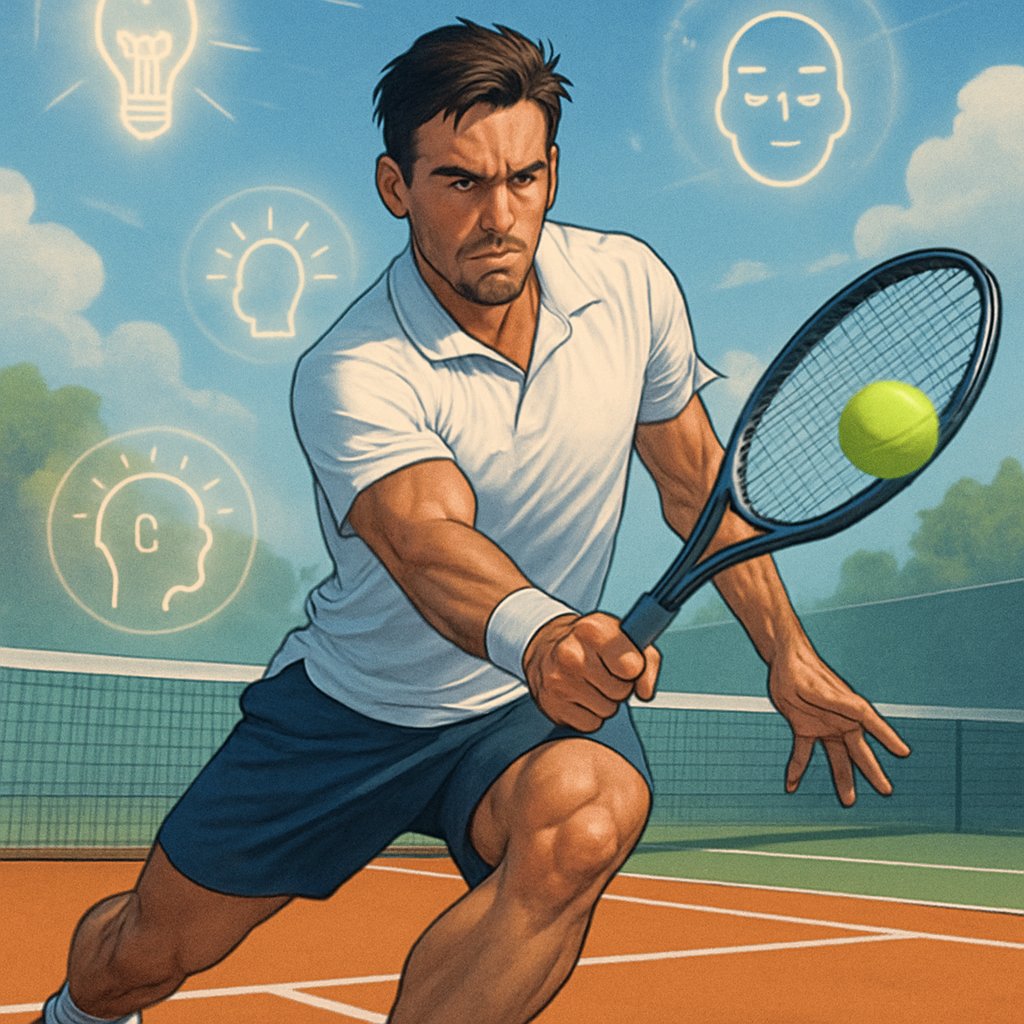
Mental toughness really comes down to four key abilities like emotional control and focus. Building these skills takes real work managing your thoughts, emotions, and reactions while you compete.
Positive Self-Talk for Confidence
Your inner voice shapes how you play. Positive self-talk swaps doubt for confidence when you’re under pressure.
Come up with simple phrases you can repeat during play. Use words like “smooth,” “focus,” or “next point” instead of letting negativity creep in.
Practice your self-talk in training first. That way, it comes naturally when the match pressure hits.
Common Positive Phrases:
- “I’ve got this”
- “Stay calm and play”
- “One point at a time”
- “Trust your shots”
Catch negative thoughts as soon as they pop up. If you catch yourself thinking “I always miss this shot,” immediately switch it to “I can make this shot.”
Write your own positive phrases before matches. Keep them short and make them fit your style of play.
Handling Pressure and High-Stress Moments
Pressure moments really show who can handle the heat. Your body and mind react fast when the stakes go up.
Physical pressure signs show up as fast breathing, tight muscles, or sweaty palms. Mental pressure signs might be racing thoughts or losing focus altogether.
Stick to your pre-shot routine, no matter the score. Take the same number of bounces before every serve, whether it’s 15-0 or match point.
Slow down when things get tense. Walk a bit slower between points and take a few deep breaths.
Stare at your strings or the court between points. It gives your mind a second to chill.
Pressure Management Techniques:
- Deep breathing (in for 4, out for 6)
- Relaxing your muscles from the shoulders down
- Feeling your feet on the court
- Repeating your pre-shot routine every time
Emotional Regulation Techniques
Tennis brings out big emotions that can mess with your game. Emotional control means keeping cool after a bad call or a missed shot.
Anger can make you rush and lose focus. Frustration tightens your muscles and leads to bad decisions. Anxiety makes you play it too safe and miss opportunities.
Regularly reflecting on your journey toward Mental Toughness for Tennis is essential for growth.
Use time between points to reset emotionally. Take three deep breaths and drop your shoulders.
Try physical cues to stay calm. Touch your strings, loosen your grip, or glance at your racquet handle.
Practice emotional control in training. Ask your coach to create frustrating situations so you can work on staying cool.
Quick Emotional Reset Steps:
Quick resets help maintain your Mental Toughness for Tennis, especially after setbacks.
- Stop and breathe deeply
- Relax your face and shoulders
- Focus just on the next point
- Show positive body language, even if you don’t feel it
Effective Coping Strategies for Setbacks
Setbacks are just part of tennis. Bad calls, missed sitters, and momentum swings happen to everyone.
Immediate coping means accepting what just happened and moving on. You can’t change the last point, but you can control the next one.
Focus on effort, positive body language, and battling for every point—forget about being perfect.
Come up with a mental reset routine after mistakes. Some players look at their strings, others take a shadow swing or fix their hat.
The 3-Point Rule helps you move on. Let yourself be upset for three points at most, then snap back and refocus.
Setback Recovery Plan:
- Accept the mistake
- Take a deep breath
- Refocus on your plan
- Attack the next point with full energy
Practice dealing with setbacks in training matches. Ask someone to make bad line calls or start you down in the score on purpose.
Mental Training Tools: Visualization and Mindfulness
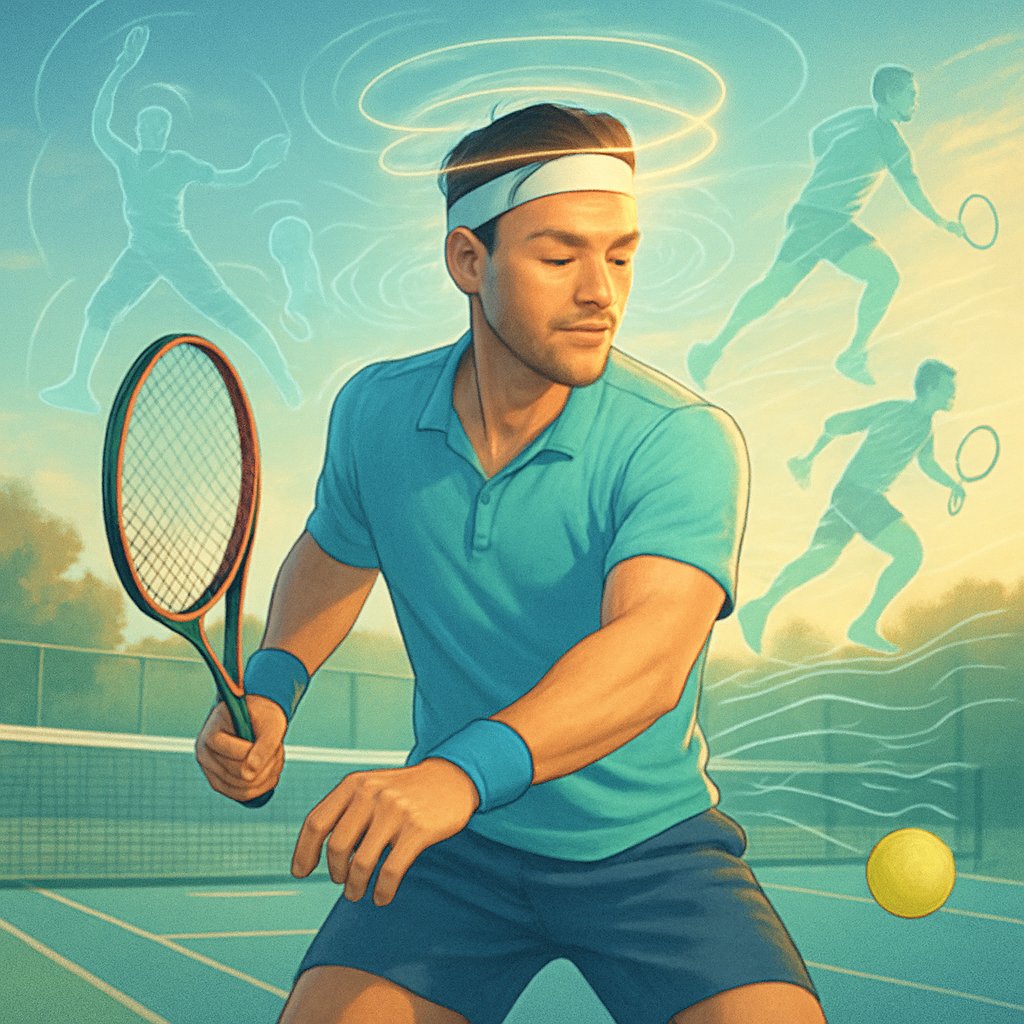
Mental training in tennis gives top players an edge using techniques that sharpen focus and boost confidence. Visualization, mindfulness, and controlled breathing sit at the core of mental conditioning for tennis.
Utilizing Visualization for Match Preparation
Visualization lets you rehearse tennis scenarios in your mind before you step on court. Picture yourself hitting perfect serves, nailing winners, and moving with confidence.
Pre-Match Visualization Steps:
Pre-match visualization is essential for enhancing Mental Toughness for Tennis.
- Find a quiet spot 15-20 minutes before you play
- Close your eyes and picture the court in detail
- See yourself making great shots with solid form
- Imagine the ball’s path, your footwork, and your follow-through
Visualize real match situations you might face. See yourself ripping a backhand down the line or digging out of a tough spot. Make it feel as real as you can.
Pros build mental toughness with visualization by practicing it every day. Use all your senses—hear the ball, feel your grip, and watch the ball spin.
Incorporating Mindfulness Into Practice
Mindfulness keeps you anchored in the present during training and matches. Notice your thoughts and feelings, but don’t let them take over your game.
Incorporating breathing exercises into training enhances Mental Toughness for Tennis.
Basic Mindfulness Techniques:
- Ball awareness: Lock in on the ball’s bounce, spin, and flight
- Body scanning: Check for tension in your shoulders, arms, and legs between points
- Present moment: Bring your mind back to the current point, not the last mistake
Try mindfulness in practice by focusing on just one thing at a time. If you’re hitting forehands, pay attention only to your contact point and follow-through.
Mindfulness techniques can make a real difference in tennis. You’ll find yourself concentrating better and shaking off distractions faster.
Mindfulness techniques contribute significantly to developing Mental Toughness for Tennis.
Breathing Exercises to Center the Mind
Controlled breathing keeps you calm under pressure and helps you reset between points. Deep breaths slow your heart and clear your head during tense moments.
Simple Tennis Breathing Pattern:
- Inhale for 4 counts through your nose
- Hold for 2 counts
- Exhale for 6 counts through your mouth
- Repeat 3-5 times between games
Use this pattern when nerves or frustration hit. Take two deep breaths before you serve or return to get centered.
Top athletes include breathing work in their daily routines. Practice these breaths in training so they become automatic in matches.
Your breathing changes your muscle tension and decision speed. Shallow breaths make your shoulders and arms tighter, which messes with your swing.
Sustaining a Competitive Mindset and Growth

Daily practices that emphasize Mental Toughness for Tennis will yield long-term benefits.
Building real mental strength takes steady effort and some strategy over months and years. The best players keep improving, learn from setbacks, and find ways to stay motivated through long seasons.
Building and maintaining Mental Toughness for Tennis requires continuous effort and dedication.
Developing Mental Strength Over Time
Mental strength grows with regular practice and by facing tough situations. Treat your mind like a muscle—it gets stronger the more you train it.
Start with small pressure moments in practice. Try playing sets where points actually matter. Serve when you’re tired or annoyed and see how you handle it.
Daily Mental Training Habits:
-
- Spend 10 minutes visualizing match situations
- Practice deep breathing between points
- Set one or two focus goals for each practice
- Review your emotions after matches
Tracking your mental state during matches enhances your Mental Toughness for Tennis.
Track your mental game just like your physical stats. Write down how you handled pressure. Note when you kept your cool and when you didn’t.
Pros build mental toughness with daily work on visualization, focus, and emotional control.
Your mental strength improves fastest when you push yourself. Play against stronger opponents. Enter tournaments that make you a bit nervous—it’s how you grow.
Learning how to bounce back is vital for fostering Mental Toughness for Tennis.
Learning from Elite Players’ Experiences
Top players share some mental habits that you can actually copy. They focus more on the process than the results, and they work hard to stay present during matches.
Watch how elite players handle bad calls or missed shots. Most have routines to reset their focus—like taking a couple of deep breaths before moving on to the next point.
Key Mental Habits of Elite Players:
-
- Same pre-serve routine every time
- Positive self-talk between points
Practicing positive self-talk is vital for nurturing your Mental Toughness for Tennis.
- Focus on one point at a time
- Quick recovery from mistakes
Mentally tough tennis players show resilience and concentration when the pressure mounts. They use positive self-talk and treat failure as a learning tool.
Study players who handle pressure well. Novak Djokovic bounces the ball a set number of times before each serve, and Rafael Nadal has his own unique routines between points.
Try copying some of these routines in your own game. Pick two or three habits from elite players and practice until they feel natural.
Maintaining Motivation Throughout the Season
Long tennis seasons can really test your mental endurance. You’ll need a few systems to keep yourself motivated, especially when results don’t show up right away.
Long-term success in the sport hinges on your understanding of Mental Toughness for Tennis.
Set process goals instead of focusing only on outcomes. Try to execute your game plan, not just chase wins.
Monthly Motivation Checklist:
Setting clear goals related to Mental Toughness for Tennis can significantly boost your motivation.
- Review progress in specific skills
- Set new technical challenges
- Schedule matches against different opponents
- Take planned rest days to avoid burnout
Building mental resilience takes patience and adaptability. You’ll need some self-belief, too—especially when things get rough.
Maintaining a focus on Mental Toughness for Tennis fosters a competitive mindset throughout the season.
Create a support system with coaches, teammates, or training partners. Having people who understand your goals can keep you accountable.
Track small improvements week by week. Maybe you served better under pressure, or you stayed calmer after a double fault. Those little wins add up.
Plan your season with different goals for each stretch. Maybe spring is about improving your serve, while summer is all about getting more match play experience.
Frequently Asked Questions
Understanding the importance of Mental Toughness for Tennis can help you answer common player questions.
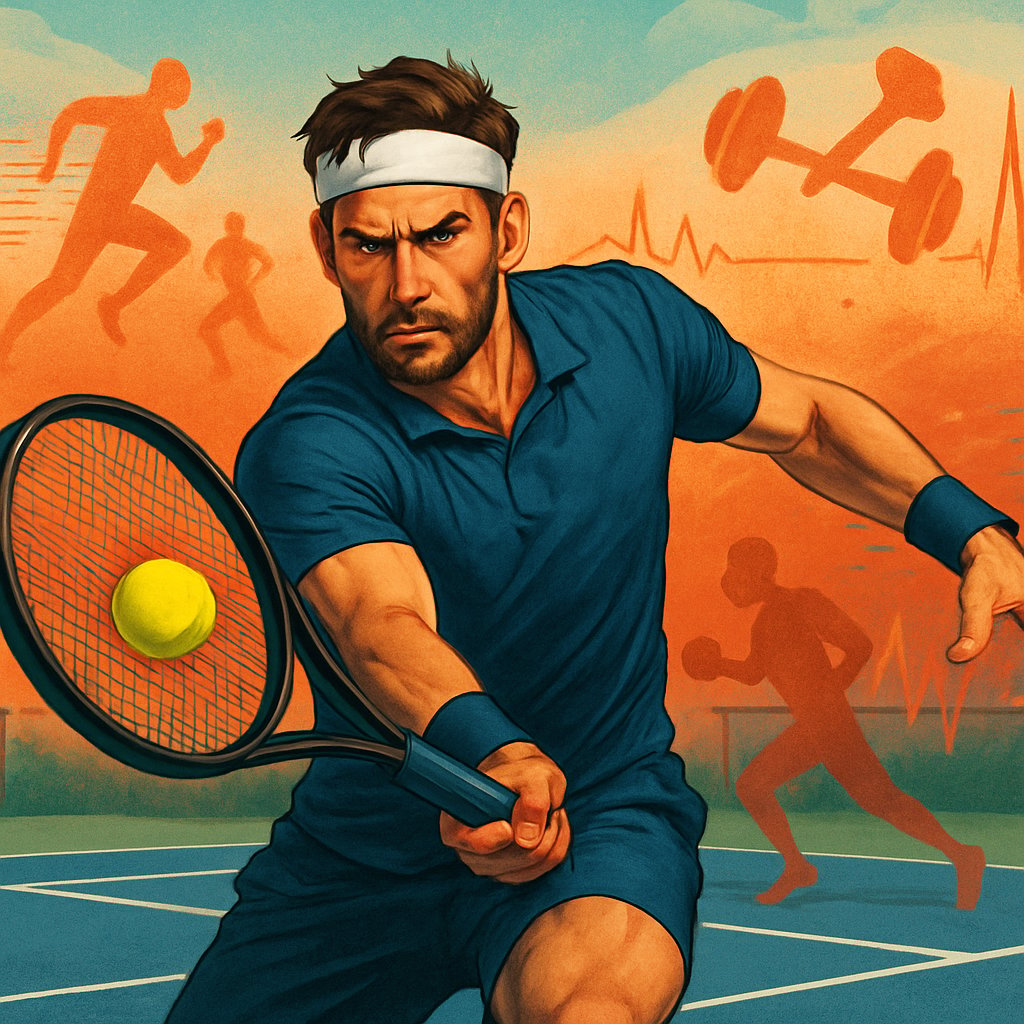
Tennis players often wonder about the best ways to strengthen their mental game and manage match pressure. These questions cover practical training techniques, resilience strategies, and the science behind psychological prep for competitive tennis.
Players often seek guidance on enhancing their Mental Toughness for Tennis and managing pressure.
What are effective mental conditioning exercises for tennis players?
Visualization is honestly one of the most powerful mental conditioning techniques for tennis players. Try imagining yourself hitting perfect shots and winning key points, especially during quiet moments off the court.
Breathing exercises are huge for staying calm. The 4-7-8 method works well: inhale for 4 counts, hold for 7, and exhale for 8.
Progressive muscle relaxation helps you release tension fast. Tense each muscle group for five seconds, then let it go completely.
Mental rehearsal of match scenarios gets you ready for the real thing. Picture coming back from a set down or serving for the match.
Incorporating visualization can strengthen your Mental Toughness for Tennis.
Which techniques can improve resilience on the tennis court?
Positive self-talk helps replace negative thoughts. Instead of “I always mess up this shot,” tell yourself, “I can execute this technique well.”
Practicing positive affirmations is a key aspect of enhancing your Mental Toughness for Tennis.
Mental resilience in tennis requires adaptability, patience, and self-belief. These qualities keep you steady through the ups and downs.
Focus on the next point instead of mistakes. That way, your attention stays in the present, not stuck on past errors.
Practicing techniques that enhance your Mental Toughness for Tennis leads to greater success in matches.
Develop pre-point routines that reset your mindset. Bouncing the ball a certain number of times or adjusting your strings can help.
How can a tennis player maintain focus during high-pressure matches?
Focusing on resilience helps you cultivate your Mental Toughness for Tennis.
Create anchor points to bring your attention back to the present. You might focus on your breathing, the feel of your racket, or your footwork.
Utilizing mindfulness helps maintain your Mental Toughness for Tennis during high-pressure matches.
Break matches into smaller chunks instead of worrying about the whole thing. Just focus on winning the current game or set.
Use between-point rituals to stay centered. Walk to your towel, take a couple of deep breaths, and visualize your next shot before serving or returning.
Building on your Mental Toughness for Tennis will help you face challenges head-on.
Concentration techniques help manage negative emotions during tough moments. Try switching your focus from internal worries to external cues like tracking the ball.
What role does psychological training play in tennis performance?
Psychological training directly affects how you perform under pressure. It teaches you to control your thoughts and emotions, especially when things get tense.
Mental conditioning sharpens your decision-making during matches. You’ll think more clearly, even if you’re tired or frustrated.
Psychological prep builds confidence. You’ll probably play more aggressively and make better shot choices when you trust your abilities.
Understanding the relationship between resilience and Mental Toughness for Tennis can improve your performance.
Can mental toughness be learned, and if so, how?
Understanding that Mental Toughness for Tennis can be cultivated through practice is essential for growth.
Mental toughness is absolutely learnable with steady practice and a bit of patience. Building mental toughness requires ongoing practice, just like physical skills.
Start with daily visualization sessions for 10-15 minutes. Picture yourself playing confidently in different match situations.
Practice pressure situations during training. Ask your coach to set up scenarios where you need to win certain points or games.
Work with a sports psychologist if you can. They’ll teach you mental strategies tailored to your specific challenges.
Why is resilience important for tennis players during competition?
To successfully compete, understanding Mental Toughness for Tennis is crucial.
Cultivating Mental Toughness for Tennis is essential for navigating the emotional rollercoaster of competition.
Tennis matches swing back and forth, constantly messing with your head. You need resilience just to hang in there when everything seems to fall apart.
Resilience plays a crucial role in your journey toward achieving Mental Toughness for Tennis.
Pushing through rough patches and bouncing back from mistakes—that’s really at the heart of mental resilience. It helps you keep your cool when the pressure cranks up.
Resilient players stick to their game plan, even if they just lost a huge point. They fight the urge to let frustration hijack their strategy.
Competition ramps up stress, no question about it. But resilience lets you channel that stress into energy, instead of letting it wreck your game.
